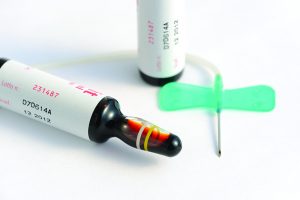Beyond Compliance: Serialization Has More to OfferBeyond Compliance: Serialization Has More to Offer
February 14, 2018
 As the global pharmaceutical industry implements serialization (track and trace from manufacturing to dispensing) to meet governmental regulatory requirements, other opportunities arise for drug companies. The main driver here is to improve the integrity of the overall drug supply chain, but other meaningful business benefits can come from serialization. Generally accomplished through automated, electronic means, it involves such practices as recording, authenticating, maintaining, and sharing accurate records of products.
As the global pharmaceutical industry implements serialization (track and trace from manufacturing to dispensing) to meet governmental regulatory requirements, other opportunities arise for drug companies. The main driver here is to improve the integrity of the overall drug supply chain, but other meaningful business benefits can come from serialization. Generally accomplished through automated, electronic means, it involves such practices as recording, authenticating, maintaining, and sharing accurate records of products.
Outside-the-Box Benefits
In addition to tightening up the supply chain and channels of trade, serialization can provide great efficiencies for processing shipments and knowing what specific packages are included in them down to the lowest salable unit. Tracking information can be updated continuously and provided to brand owners and supply chain partners on dashboards or through mobile applications. Developments in enhanced track and trace can be used to detect diversion of products to unauthorized regions both quickly and accurately.
Serialization can help the industry combat counterfeiting. New authentication technologies can link serial numbers to security features that are unique to each package so that companies can detect possible replication of serial numbers by counterfeiters.
Despite increases in the quality of biomanufacturing processes, the periodic need for product recalls is an unavoidable reality of the pharmaceutical industry. Serialization can be used to provide for selective identification and notification of products to be recalled. Also it can help biopharmaceutical companies investigate the causes of manufacturing problems that lead to recalls.
Expired products usually are returned for credits in accordance with supplier contracts. In some cases, however, it is difficult to track the selling prices accurately for specific products. Interfacing serial numbers with enterprise resource planning (ERP) systems can provide accurate pricing and shipping information for specific products. Serialization also can help drug companies verify that goods being returned are authentic.
Statistics on medication adherence have revealed that half of all medications may not be not taken as prescribed. That can limit severely the therapeutic effect of a drug. Software for tracking serial numbers can be used to establish a means for patients to record that they have taken their medication — and if not, a prescribing physician or designated caregiver can intervene. Adherence during clinical trials is uniquely important to ensure the integrity of each drug study. Patients enrolled in a trial can be provided with a user-friendly mobile application that is programmed to remind them when to take their medicine, and data can be collected through that application to determine overall adherence for all patients. During expensive drug trials, sponsors can use such methodology to help ensure that their products are used correctly.
To enhance overall patient experiences and outcomes, communications programs can be developed that require users to register for product-promotion programs (e.g., coupons). Webinars can be made available to patients who provide the serial numbers of their current prescriptions. Drug sponsors can benefit from such a direct communications channel with patients given the amount of unfiltered information that could be obtained this way.
The biopharmaceutical industry is giving increased attention to the concept of a connected enterprise. Great benefits can come from linking the operational units of each organization: R&D, manufacturing, packaging, supply chain, finance, and sales/marketing. Serial numbers can be a critical enabling technology to enable tracking the life of a product: e.g., when it was made and raw materials that were used; when and where and what was packaged; and when and how it was shipped, at what price, and to what region. Additionally, with end-user patient communications programs as described above, timely and accurate marketing data can be obtained directly so that product sponsors need not purchase such data from market-research companies.
Forging Connections
Much of the biopharmaceutical industry is well on its way to implementing serialization to comply with regulatory requirements. Now a return on investment can be realized by developing business-benefit programs using package serial numbers in other ways.
Advances in technology certainly have increased the efficiencies of today’s drug businesses. But too many organizational units are isolated in “silos,” limiting their opportunities for cross collaboration and for obtaining and using timely information from customers, suppliers, and distribution partners. Companies should hold meetings with cross-functional groups to stimulate thought and discussion about these and other possible benefits of track and trace. Serialization can be a highly effective method for facilitating the transfer of timely and comprehensive information throughout the many functional units of a biopharmaceutical enterprise as well as its market and external partners — and most important, its customers.
Steve Wood is president and chief executive officer of Covectra, 1500 West Park Drive #100, Westborough, MA 01581; 1-508-621-7320. With a US Naval Academy bachelor of science and a masters of business administration from Yale, he has over 25 years of experience as cofounder and CEO of five companies in the processing and packaging machinery, pharmaceutical security technologies, and integrated systems industries — and currently serves on the board of directors for both PharmoRx Therapeutics and MedSentry.
You May Also Like






